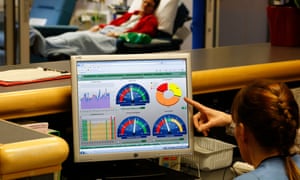
We know it's lonely at the top of the NHS[1]. Top jobs are highly pressured in any environment but try overlaying that with the imperative to provide safe and high-quality services for patients with complex needs in a climate of severe financial constraint, enormous public scrutiny and a feverish media, and the leadership pressure gauge has just rocketed off the scale.
But does it need to be?
We assume leadership is all about chief executives' ability to lead from the top: the success of an organisation is credited to the exceptional leadership of the person in that role, failure equally so. But with NHS chief executives' typically staying in post only two and a half years[3], we have to consider both how realistic that assumption is and how sustainable, for both the person and the business.
Good leadership across the NHS must be about empowering staff to deliver quality services to patients, and each and every person involved should feel accountable for the part they play.
The word "empowering" is often overused to the point that it's meaningless, but in this case it is absolutely right – the ability to discharge power, to liberate it in others and to provide sufficient space for others to seize and own their own power.
Effective leadership development is a means to enabling this in the NHS; tapping into its diverse pool of initiative, innovation and commitment and fostering a culture of leadership based on the values of the NHS we all so passionately believe in. It is vital if we are to achieve the radical, transformational shift needed to deliver a sustainable health service across our local communities.
So, who are the leaders in the NHS? Yes, those at the top, arguably with a disproportionate impact on the working lives of those in their organisation. But more than 1.3 million people make up the NHS workforce[4], and many are leaders without the formal title. Day in and day out they lead their own areas of work and strive for better experiences for patients, but how do we unlock and harness all that talent and those leadership skills to drive better-led services across the NHS? The answer is not by accident or by wishing it so.
The widespread use of consultancy firms[5] by NHS providers (the NHS spent £420m on management consultants in 2014/15) is often because we are buying in skills we could much more efficiently and productively develop in our own staff if we invested in them properly, with the return on investment that would inevitably bring over time. There are two issues here: our reluctance to commit the upfront investment this would take to get our leaders appropriately skilled, and also because we don't necessarily have the confidence we should have in our own staff – partly because they haven't been developed. It's a vicious circle.
For senior management grappling with ever tighter budgets, the temptation must be to rein in or cut staff training and development but this would be a false economy. Tomorrow's leaders need to be patient-centric, system-wise, politically astute, and commercially savvy, and possess a steely determination to see things through. They need competence, skills, expertise, experience and support.
This comes from expert development and training as well as on-the-job learning. They need the ability to build alliances with a wide range of professionals and across organisational boundaries to serve the needs of diverse communities with enduringly complex needs. They also need to be compassionate people. That's the one thing you can't teach, but fortunately the NHS has it in abundance.
It's imperative that the leaders across the entire health and care system are supported with the development to acquire the necessary practical skills, have the confidence when needed to relinquish power and unlock it in others, have the knowledge to help shape new ways of working and have the ability to engage, empower and excite both staff and communities.
The NHS is replete with expert leadership at every level. It doesn't have to be lonely at the top.
References
- ^ NHS (www.theguardian.com)
- ^ 'Some chief executives are surprised by the loneliness' – Dame Mary Marsh (www.theguardian.com)
- ^ two and a half years (www.kingsfund.org.uk)
- ^ 1.3 million people make up the NHS workforce (www.hscic.gov.uk)
- ^ widespr ead use of consultancy firms (www.gov.uk)
- ^ We must not take NHS workers for granted (www.theguardian.com)



